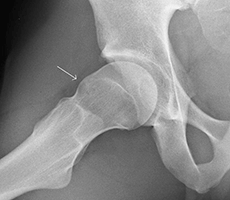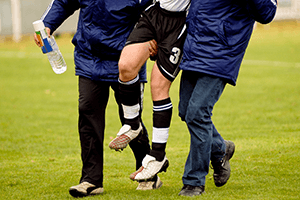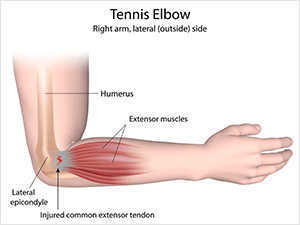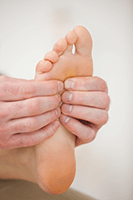Pain in your foot? Learn more about Plantar Fasciitis
 Have you been experiencing pain along the arch of your foot near the base of heel? Do you feel like you have a bruise on the pad of your heel?
Have you been experiencing pain along the arch of your foot near the base of heel? Do you feel like you have a bruise on the pad of your heel?
Plantar fasciitis is inflammation of the fibrous tissue that lies on the sole of your foot extending from the heel to the base of the toes.
The theory behind plantar fasciitis is that there is a cumulative overload on the feet causing microtears and degeneration of the plantar fascia tissue. Contributing factors to this overload may be: anatomical variations such as being flat footed; excessive foot pronation; inadequate footwear; change in training methods and intensity; tight calf muscles; or being overweight.

 Quadriceps contusion or “cork thigh” is the result of a severe impact to the thigh, often causing deep rupture to the muscle tissue and bleeding occurs, followed by inflammation.
Quadriceps contusion or “cork thigh” is the result of a severe impact to the thigh, often causing deep rupture to the muscle tissue and bleeding occurs, followed by inflammation. Femoroacetabular impingement (FAI) is a condition where the two bones of the hip are abnormally shaped, hence do not fit together properly, causing the two bones to rub against each other and cause damage to the joint.
Femoroacetabular impingement (FAI) is a condition where the two bones of the hip are abnormally shaped, hence do not fit together properly, causing the two bones to rub against each other and cause damage to the joint. High ankle sprains occur when there is damage to the ligaments or soft tissue membrane that connect the tibia to the fibula (the bones that make up the lower leg). These high ankle ligaments, known as the syndesmosis, connect the two ankle bones together and allow some rotation. The syndesmosis is made up of two ligaments (tibiofibular ligaments) and an interosseous membrane.
High ankle sprains occur when there is damage to the ligaments or soft tissue membrane that connect the tibia to the fibula (the bones that make up the lower leg). These high ankle ligaments, known as the syndesmosis, connect the two ankle bones together and allow some rotation. The syndesmosis is made up of two ligaments (tibiofibular ligaments) and an interosseous membrane.  If you suffer from tennis elbow here are some helpful tips for trying to aid recovery and prevent recurrence.
If you suffer from tennis elbow here are some helpful tips for trying to aid recovery and prevent recurrence. A stress fracture is a tiny crack in a weight bearing bone. It can occur in any part of the body but predominantly occur in the lower leg or feet.
A stress fracture is a tiny crack in a weight bearing bone. It can occur in any part of the body but predominantly occur in the lower leg or feet.